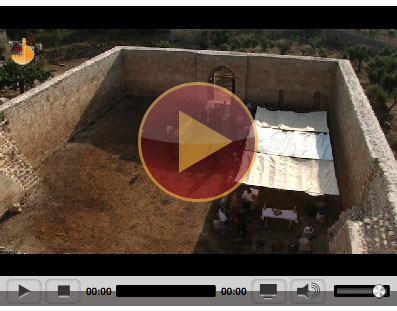
The Feast at Sepphoris
At Sepphoris, 26th July is a special date. In this small Galilean village, the day commemorating Saints Joachim and Anna, the parents of Our Lady, has a particular flavour, because this is the first time that the Mass, attended by so many of the local community, has been held in the Sanctuary since the completion of major restoration work – a job, said Father Quirico, that reflects the tireless task of the Custody of the Holy Land.
Fr. QUIRICO CALELLA, ofm
Custody of the Holy Land
“In 1870, the Franciscans bought this church, this holy place, and then only a partial restoration was done, leaving the church without a covering”
At the site of the house where the parents of the Virgin lived and where, according to tradition, Mary would have had her the first birthday, the work was begun sometime ago. This made a complete restoration of the enclosure possible, as well as maintenance of the plumbing. More recently the construction of a small guesthouse for pilgrims was also planned. It is important to combine the conservation of these holy places with the memories associated with them.
Fr. QUIRICO CALELLA, ofm
Custody of the Holy Land
“By conserving these places, we are ensuring that, in the future, Christians will have a place to pray and recall the people and events commemorated by these sanctuaries. If we did not do this, we would lose not only the memorial, but also the property”
And among the ruins of a basilica built in the 12th century, the faithful have taken their places for the Mass, which will be celebrated entirely in Arabic. Priests have arrived from all over Galilee to participate in this memorial, in a centuries-old tradition, which, in the land called holy by Christians, it is important to keep.
Fr. QUIRICO CALELLA, ofm
Custody of the Holy Land
“Tradition says that St. Anna was born here in Sepphoris, a place which is not famous in the Old Testament, but which became famous afterwards, in the post-biblical period. We commemorate this tradition and transmit it to future generations.
At Sepphoris, 26th July is a special date. In this small Galilean village, the day commemorating Saints Joachim and Anna, the parents of Our Lady, has a particular flavour, because this is the first time that the Mass, attended by so many of the local community, has been held in the Sanctuary since the completion of major restoration work – a job, said Father Quirico, that reflects the tireless task of the Custody of the Holy Land.
Fr. QUIRICO CALELLA, ofm
Custody of the Holy Land
“In 1870, the Franciscans bought this church, this holy place, and then only a partial restoration was done, leaving the church without a covering”
At the site of the house where the parents of the Virgin lived and where, according to tradition, Mary would have had her the first birthday, the work was begun sometime ago. This made a complete restoration of the enclosure possible, as well as maintenance of the plumbing. More recently the construction of a small guesthouse for pilgrims was also planned. It is important to combine the conservation of these holy places with the memories associated with them.
Fr. QUIRICO CALELLA, ofm
Custody of the Holy Land
“By conserving these places, we are ensuring that, in the future, Christians will have a place to pray and recall the people and events commemorated by these sanctuaries. If we did not do this, we would lose not only the memorial, but also the property”
And among the ruins of a basilica built in the 12th century, the faithful have taken their places for the Mass, which will be celebrated entirely in Arabic. Priests have arrived from all over Galilee to participate in this memorial, in a centuries-old tradition, which, in the land called holy by Christians, it is important to keep.
Fr. QUIRICO CALELLA, ofm
Custody of the Holy Land
“Tradition says that St. Anna was born here in Sepphoris, a place which is not famous in the Old Testament, but which became famous afterwards, in the post-biblical period. We commemorate this tradition and transmit it to future generations.

